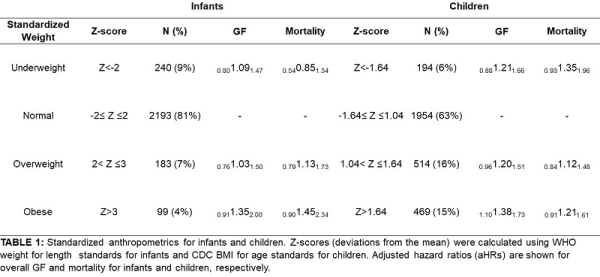Role of Obesity in Pediatric Liver Transplantation
JHU, Baltimore, MD.
Meeting: 2018 American Transplant Congress
Abstract number: B287
Session Information
Session Name: Poster Session B: Liver: Pediatrics
Session Type: Poster Session
Date: Sunday, June 3, 2018
Session Time: 6:00pm-7:00pm
 Presentation Time: 6:00pm-7:00pm
Presentation Time: 6:00pm-7:00pm
Location: Hall 4EF
PURPOSE: Pediatric obesity rates are climbing and the prevalence of obesity in children undergoing liver transplantation now exceeds that of the general population. Studies in adult liver transplant recipients vary: recent studies suggest that obesity may be associated with early post-transplant mortality, while others suggest that obesity may not be associated with post-transplant mortality at all. Pediatric data is limited and has not accounted for standardized age specific guidelines for defining obesity. We hypothesized that obese children experienced worse outcomes early after liver transplantation.
METHODS: Using SRTR data, we explored the differences in graft failure (GF) and mortality for first-time pediatric liver transplant recipients from March 2002 until December 2016, stratified by age (≤24 months [infants], n=2715; >24 months [children], n=3131). Weight categories were defined by standardized anthropometrics (Table 1). We used Cox proportional hazards models to evaluate the associations between standardized weight and GF and mortality after adjusting for age (children only), gender, hospitalization status, recipient diagnosis, race, graft type, and insurance type. We also evaluated whether the hazard varied by time since transplant (<1 year [early], >1 year [late]).
RESULTS: Standardized weight had no effect on GF or mortality in infants, except for an increased risk of late GF in obese infants (aHR: 1.242.294.22).Overweight and obese children had higher rates of early GF (aHR:1.071.451.97; 1.221.642.22) and early mortality (aHR:1.131.672.45; 1.131.662.44) but had similar rates of late GF and mortality. Overall GF was higher in obese children (aHR:1.101.381.73) but no difference was seen in overall mortality. Underweight infants and children did not experience worse post-transplant outcomes.
CONCLUSION: Overweight and obese children experience worse outcomes early after liver transplantation, but these differences do not persist after the first year. Physicians should counsel families on the potential risks of excess weight after liver transplantation.
CITATION INFORMATION: Covarrubias K., Denhard M., Luo X., Garonzik-Wang J., Cameron A., Segev D., Mogul D. Role of Obesity in Pediatric Liver Transplantation Am J Transplant. 2017;17 (suppl 3).
To cite this abstract in AMA style:
Covarrubias K, Denhard M, Luo X, Garonzik-Wang J, Cameron A, Segev D, Mogul D. Role of Obesity in Pediatric Liver Transplantation [abstract]. https://atcmeetingabstracts.com/abstract/role-of-obesity-in-pediatric-liver-transplantation/. Accessed February 19, 2026.« Back to 2018 American Transplant Congress

